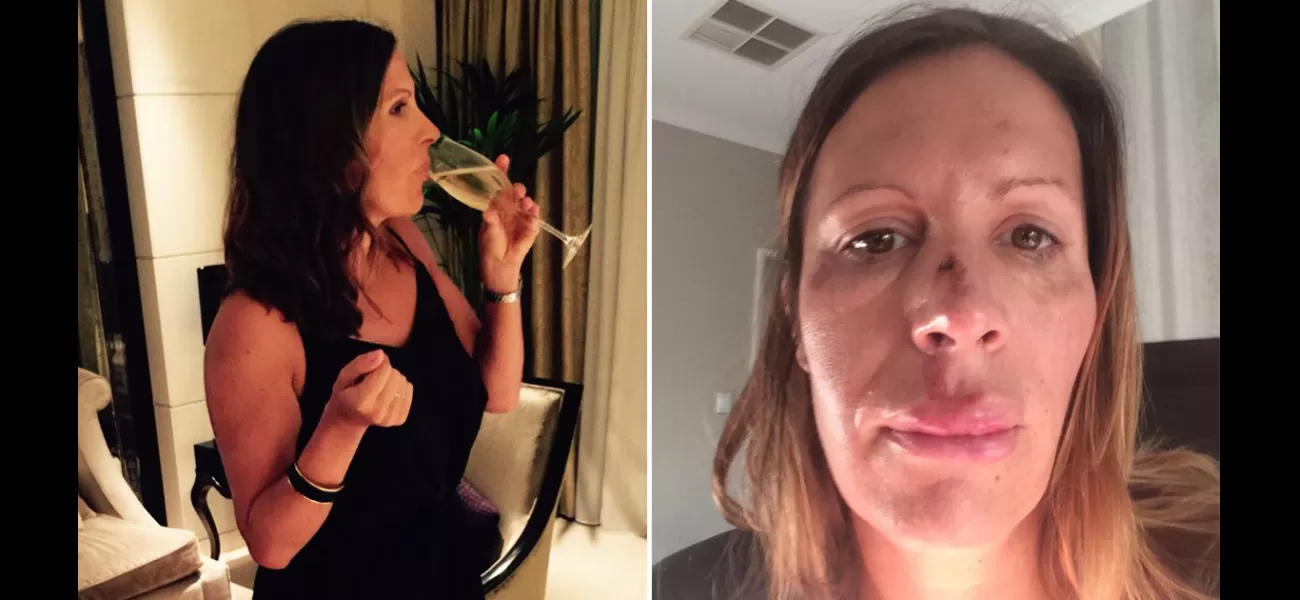Drinking was uncertain until my daughter's influence.
Society has made it acceptable for women to drink regularly, but this is not the case for men, which can be harmful.
January 22nd 2024.

Sarah had always enjoyed a glass of wine, but over time, it had become a nightly ritual for her. She had even jokingly referred to herself as a "wine mummy." However, one morning, she woke up to find her young daughter staring at her with concern. Her face was bruised and bloody, a result of the wild night she had the previous evening.
Through her hazy memories, Sarah recalled the party she had attended, filled with champagne, cigarettes, and loud music. She hadn't eaten much beforehand, and as the night went on, she found herself drinking more than she intended. It wasn't until she went outside for a cigarette and lost her balance, falling face-first onto the concrete, that things took a turn for the worse.
As she lay in bed the next morning, her daughter's innocent question about her face triggered a realization within Sarah. She couldn't continue down this path of excessive drinking and reckless behavior. It was time for a change.
Despite the fact that her drinking had led her to new friends and exciting opportunities, it had also taken a toll on her life. As a mother, she felt like she was becoming a stranger to her own children. This realization hit her hard, especially since she had fond memories of drinking being a fun and festive part of her childhood.
Growing up in Edinburgh, Sarah's family always celebrated Burns Night with plenty of alcohol. It seemed that drinking equaled having a good time, and this mindset carried over into her teenage years in Manchester. To fit in with her new classmates, she started drinking at the young age of 14, often getting drunk in the park with her friends.
When she moved to London for a job in her early twenties, the drinking culture only intensified. In the 90s, women were increasingly targeted in alcohol advertising campaigns, and it seemed like everyone was out partying and getting "leathered." Sarah, who considered herself a "party girl" at the time, continued to drink heavily as she traveled the world and eventually met her partner in Australia.
As they started a family together, Sarah's wild nights out turned into quiet evenings at home with a bottle of wine. However, her drinking didn't stop there. She would often drink in front of her children, thinking it was harmless. The "mummy wine culture" was becoming popular, and Sarah felt pressure to fit in and enjoy her nightly glass of wine.
But as time went on, Sarah realized that she had developed a dysfunctional relationship with alcohol. She didn't like the person she became when she was drinking, and she knew it was affecting her role as a mother. After splitting her lip and waking up to her daughter's concerned face, Sarah decided to challenge herself to stop drinking for 100 days.
It wasn't easy. Her friends were disappointed, and her husband missed having his "drinking buddy." But Sarah stayed strong and found other ways to distract herself, like doing chores around the house. As her husband reached for a beer at the end of each day, Sarah found healthier ways to unwind and enjoy her evenings without alcohol.
It took time, but Sarah eventually learned to enjoy life without relying on alcohol. She became a better mother and felt more in control of her life. Looking back, she realized that the messages she received about "mums needing wine" were not only misleading but harmful. She was determined to break free from the drinking culture and set a positive example for her children.
Sarah was known to her friends and family as a "wine mummy" because she would drink a bottle of wine every night. However, one morning, as she woke up from a night of champagne, cigarettes, and music, her five-year-old daughter noticed something different about her face. Sarah struggled to remember the previous night but could only recall blurry images of her friend's 40th birthday party. She had not eaten much and had consumed a lot of champagne, which was constantly being refilled. At one point, she had gone outside for a cigarette, something she only did when she was drunk. But as she tried to put it out, her high heels caused her to lose her balance and fall face-first onto the concrete driveway. She woke up the next morning with her daughter standing next to her, asking what had happened to her face. It was at that moment that Sarah realized she couldn't continue living like this.
This incident was just one of many chaotic moments that Sarah's drinking had led her to. While it had brought her new friends, an exciting job in London, and a partner, it had also caused her to feel like a stranger to her own children. Growing up in Edinburgh, Sarah's family always had a lot of alcohol at their Burns Night celebrations, and she associated drinking with having fun. When her family moved to Manchester when she was thirteen, she was determined to fit in with her new classmates. So she started drinking at the age of fourteen, using whatever alcohol she could find in her parents' drink cabinet mixed with soda, and going to the park to get drunk with her friends.
When she was twenty-one, Sarah moved to London for a job in recruitment. The job had four interview stages, and the last one involved going to the pub and seeing how well she could handle shots of tequila. It was the 90s, a time when alcohol advertising was heavily targeting women. Sarah explains that it was the era of "sex positivity, girl power, and women being themselves." Influenced by role models like Zoe Ball and Kate Moss, who were often seen going out and getting drunk, it was considered cool to have a drinking culture. This was not just limited to Britain, but was happening all around the world.
Sarah, who was known as a "party girl" at the time, saved up enough money to go traveling. From Thailand to America, and everywhere in between, she continued to drink. It was during this time that she met her partner from New Zealand at a backpacker's bar in Australia. They moved to Perth, Australia, together, where they started a family. Sarah gave up her fancy nights out for a more domestic life, but the drinking didn't stop. She would have a glass of wine while cooking dinner or doing the ironing, and then finish a bottle before going to bed. This became her daily routine, and she justified it by the "mummy wine culture" that was popular at the time. This culture portrayed mothers as deserving a glass of wine after a hard day, and Sarah bought into it completely.
However, Sarah soon realized that she had developed a dysfunctional relationship with alcohol. She was not the kind of mother she wanted to be, either being drunk in the evenings or hungover in the mornings. But she couldn't stop drinking. Even when she did go out to a party, she never knew if she would have one or two drinks and be fine, or if it would lead to a crazy night with blackouts.
After splitting her lip and waking up to her daughter's concern, Sarah decided to challenge herself to stop drinking for 100 days. It was a difficult journey, as her friends seemed disappointed and her husband felt like he had lost his drinking buddy. While he would reach for a beer at the end of the day, Sarah would distract herself with household chores. It was a challenging but eye-opening experience for Sarah, who realized that she didn't need alcohol to have fun or be a good mother. She now leads a sober life and is grateful for the positive changes it has brought to her and her family.
Through her hazy memories, Sarah recalled the party she had attended, filled with champagne, cigarettes, and loud music. She hadn't eaten much beforehand, and as the night went on, she found herself drinking more than she intended. It wasn't until she went outside for a cigarette and lost her balance, falling face-first onto the concrete, that things took a turn for the worse.
As she lay in bed the next morning, her daughter's innocent question about her face triggered a realization within Sarah. She couldn't continue down this path of excessive drinking and reckless behavior. It was time for a change.
Despite the fact that her drinking had led her to new friends and exciting opportunities, it had also taken a toll on her life. As a mother, she felt like she was becoming a stranger to her own children. This realization hit her hard, especially since she had fond memories of drinking being a fun and festive part of her childhood.
Growing up in Edinburgh, Sarah's family always celebrated Burns Night with plenty of alcohol. It seemed that drinking equaled having a good time, and this mindset carried over into her teenage years in Manchester. To fit in with her new classmates, she started drinking at the young age of 14, often getting drunk in the park with her friends.
When she moved to London for a job in her early twenties, the drinking culture only intensified. In the 90s, women were increasingly targeted in alcohol advertising campaigns, and it seemed like everyone was out partying and getting "leathered." Sarah, who considered herself a "party girl" at the time, continued to drink heavily as she traveled the world and eventually met her partner in Australia.
As they started a family together, Sarah's wild nights out turned into quiet evenings at home with a bottle of wine. However, her drinking didn't stop there. She would often drink in front of her children, thinking it was harmless. The "mummy wine culture" was becoming popular, and Sarah felt pressure to fit in and enjoy her nightly glass of wine.
But as time went on, Sarah realized that she had developed a dysfunctional relationship with alcohol. She didn't like the person she became when she was drinking, and she knew it was affecting her role as a mother. After splitting her lip and waking up to her daughter's concerned face, Sarah decided to challenge herself to stop drinking for 100 days.
It wasn't easy. Her friends were disappointed, and her husband missed having his "drinking buddy." But Sarah stayed strong and found other ways to distract herself, like doing chores around the house. As her husband reached for a beer at the end of each day, Sarah found healthier ways to unwind and enjoy her evenings without alcohol.
It took time, but Sarah eventually learned to enjoy life without relying on alcohol. She became a better mother and felt more in control of her life. Looking back, she realized that the messages she received about "mums needing wine" were not only misleading but harmful. She was determined to break free from the drinking culture and set a positive example for her children.
Sarah was known to her friends and family as a "wine mummy" because she would drink a bottle of wine every night. However, one morning, as she woke up from a night of champagne, cigarettes, and music, her five-year-old daughter noticed something different about her face. Sarah struggled to remember the previous night but could only recall blurry images of her friend's 40th birthday party. She had not eaten much and had consumed a lot of champagne, which was constantly being refilled. At one point, she had gone outside for a cigarette, something she only did when she was drunk. But as she tried to put it out, her high heels caused her to lose her balance and fall face-first onto the concrete driveway. She woke up the next morning with her daughter standing next to her, asking what had happened to her face. It was at that moment that Sarah realized she couldn't continue living like this.
This incident was just one of many chaotic moments that Sarah's drinking had led her to. While it had brought her new friends, an exciting job in London, and a partner, it had also caused her to feel like a stranger to her own children. Growing up in Edinburgh, Sarah's family always had a lot of alcohol at their Burns Night celebrations, and she associated drinking with having fun. When her family moved to Manchester when she was thirteen, she was determined to fit in with her new classmates. So she started drinking at the age of fourteen, using whatever alcohol she could find in her parents' drink cabinet mixed with soda, and going to the park to get drunk with her friends.
When she was twenty-one, Sarah moved to London for a job in recruitment. The job had four interview stages, and the last one involved going to the pub and seeing how well she could handle shots of tequila. It was the 90s, a time when alcohol advertising was heavily targeting women. Sarah explains that it was the era of "sex positivity, girl power, and women being themselves." Influenced by role models like Zoe Ball and Kate Moss, who were often seen going out and getting drunk, it was considered cool to have a drinking culture. This was not just limited to Britain, but was happening all around the world.
Sarah, who was known as a "party girl" at the time, saved up enough money to go traveling. From Thailand to America, and everywhere in between, she continued to drink. It was during this time that she met her partner from New Zealand at a backpacker's bar in Australia. They moved to Perth, Australia, together, where they started a family. Sarah gave up her fancy nights out for a more domestic life, but the drinking didn't stop. She would have a glass of wine while cooking dinner or doing the ironing, and then finish a bottle before going to bed. This became her daily routine, and she justified it by the "mummy wine culture" that was popular at the time. This culture portrayed mothers as deserving a glass of wine after a hard day, and Sarah bought into it completely.
However, Sarah soon realized that she had developed a dysfunctional relationship with alcohol. She was not the kind of mother she wanted to be, either being drunk in the evenings or hungover in the mornings. But she couldn't stop drinking. Even when she did go out to a party, she never knew if she would have one or two drinks and be fine, or if it would lead to a crazy night with blackouts.
After splitting her lip and waking up to her daughter's concern, Sarah decided to challenge herself to stop drinking for 100 days. It was a difficult journey, as her friends seemed disappointed and her husband felt like he had lost his drinking buddy. While he would reach for a beer at the end of the day, Sarah would distract herself with household chores. It was a challenging but eye-opening experience for Sarah, who realized that she didn't need alcohol to have fun or be a good mother. She now leads a sober life and is grateful for the positive changes it has brought to her and her family.
[This article has been trending online recently and has been generated with AI. Your feed is customized.]
[Generative AI is experimental.]
0
0
Submit Comment





